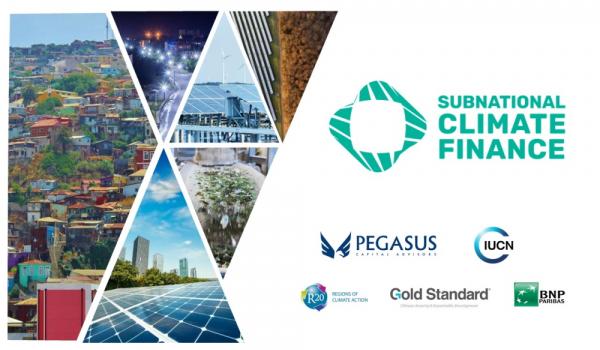Opportunities for cities and nature amid dire climate change impacts
Human-induced climate change is causing dangerous and widespread disruption in nature and affecting the lives of billions of people around the world, despite efforts to reduce the risks. People and ecosystems least able to cope are being hardest hit, said scientists in the latest Intergovernmental Panel on Climate Change (IPCC) report, released on 28 February.
Cities: Hotspots of impacts and risks, but also a crucial part of the solution
The report provides a detailed assessment of climate change impacts, risks and adaptation in cities, where more than half the world’s population lives. People’s health, lives and livelihoods, as well as property and critical infrastructure, including energy and transportation systems, are being increasingly adversely affected by hazards from heatwaves, storms, drought and flooding as well as slow-onset changes, including sea level rise.
Together, growing urbanization and climate change create complex risks, especially for those cities that already experience poorly planned urban growth, high levels of poverty and unemployment, and a lack of basic services.
Cities also provide opportunities for climate action.
Green buildings, reliable supplies of clean water and renewable energy, and sustainable transport systems that connect urban and rural areas can all lead to a more inclusive, fairer society.
~ Debra Roberts, co-chair of the scientist working group Tweet
The headline statement about urban areas from the report is the following:
Interactions between changing urban form, exposure and vulnerability can create climate change-induced risks and losses for cities and settlements. However, the global trend of urbanisation also offers a critical opportunity in the near-term, to advance climate resilient development (high confidence). Integrated, inclusive planning and investment in everyday decision-making about urban infrastructure, including social, ecological and grey/physical infrastructures, can significantly increase the adaptive capacity of urban and rural settlements. Equitable outcomes contribute to multiple benefits for health and well-being and ecosystem services, including for Indigenous Peoples, marginalised and vulnerable communities (high confidence). Climate resilient development in urban areas also supports adaptive capacity in more rural places through maintaining peri-urban supply chains of goods and services and financial flows (medium confidence). Coastal cities and settlements play an especially important role in advancing climate resilient development (high confidence).
Cities and settlements are crucial for delivering urgent climate action. The concentration and interconnection of people, infrastructure and assets within and across cities and into rural areas creates both risks and solutions at global scale.
Climate change has altered marine, terrestrial and freshwater ecosystems all around the world (very high confidence). Climate change has caused local species losses, increases in disease (high confidence), and mass mortality events of plants and animals (very high confidence), resulting in the first climate driven extinctions (medium confidence), ecosystem restructuring, increases in areas burned by wildfire (high confidence), and declines in key ecosystem services (high confidence). Climate-driven impacts on ecosystems have caused measurable economic and livelihood losses and altered cultural practices and recreational activities around the world (high confidence).
Nature-based solutions (NbS) are all the rage, and rightly so. Working with nature makes sense. But urban systems and ecosystems are complex, so using NbS requires smart governance and technical know-how. Find what you need on the CitiesWithNature Tools & Resources Hub!
By Pieter Botha, CitiesWithNature Global Coordinator: Technical Development and Knowledge Management
Nature-based solutions are being used more and more by cities to boost their climate resilience and provide numerous other benefits for their citizens, both human and non-human. The field is developing rapidly, with many new studies and reports being published by global organisations like IUCN, ICLEI and WWF. How can cities stay up to speed and access the latest expert insights?
The Tools & Resources Hub on the CitiesWithNature platform provides easy access to a wide range of reliable resources and cutting-edge tools on nature-based solutions. All in one place, and for free.
Below are some appetisers. For the entire buffet, visit the CitiesWithNature Tools & Resources Hub.
- Smart, Sustainable and Resilient Cities: the Power of Nature-based Solutions This working paper for the G20 investigates the potential of NbS to help build smart, sustainable and resilient cities. It covers best practices of NbS implementation in cities around the world and guiding principles for their implementation, with insights from global experts from ICLEI, UNEP, WWF and other leading organisations. Get it here.
- Urban Nature Atlas: A Database of Nature-Based Solutions Across 100 European Cities This report from the Naturvation project gives an overview of the Urban Nature Atlas which gathers NbS projects and insights from across Europe. Get it here.
- Nature-based Solutions to Climate Change Adaptation in Urban Areas This comprehensive book explores the dynamics, challenges, and breakthroughs in accelerating the uptake of NbS in cities. Get it here.
- Urban Natural Assets for Africa Handbook Series How best to involve community members in planning and implementation of NbS? This handbook from ICLEI’s Urban Natural Assets project provides a collection of creative tools to encourage local participation and action in sub-Saharan Africa. Get it here.
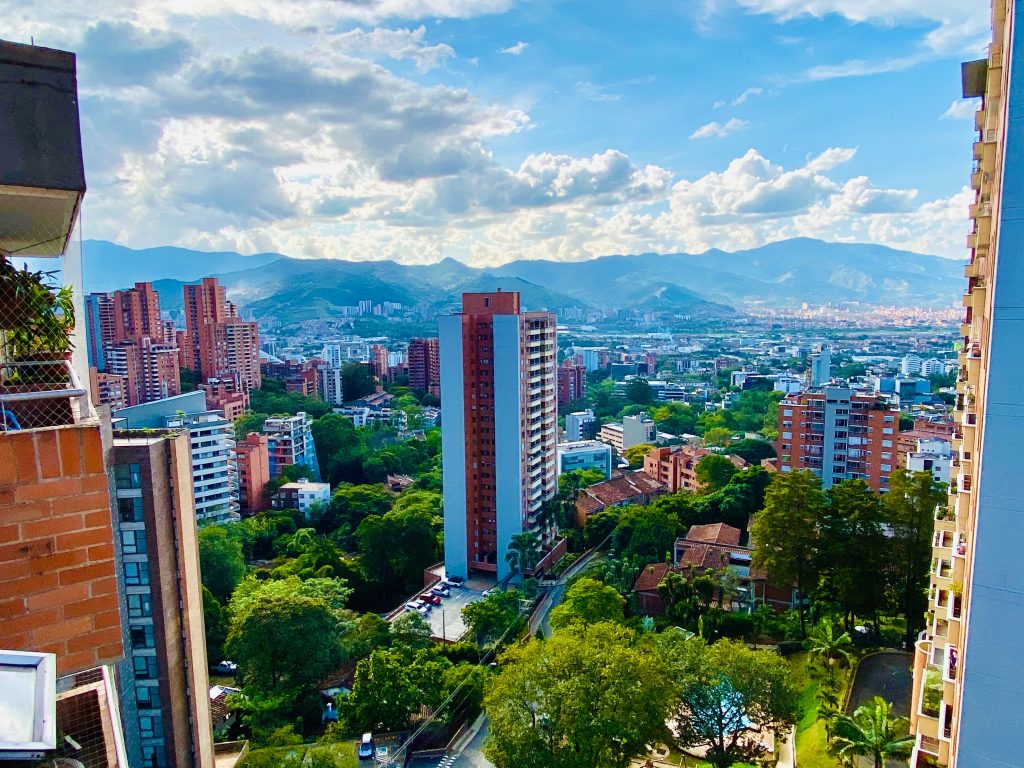
Medellín’s Green Corridors Project has created ecological continuity between several natural areas to support biodiversity and people’s well-being in Colombia’s second largest city. Medellín is one of the leading cities that have joined CitiesWithNature. Photo: GlobalCareerBook.com
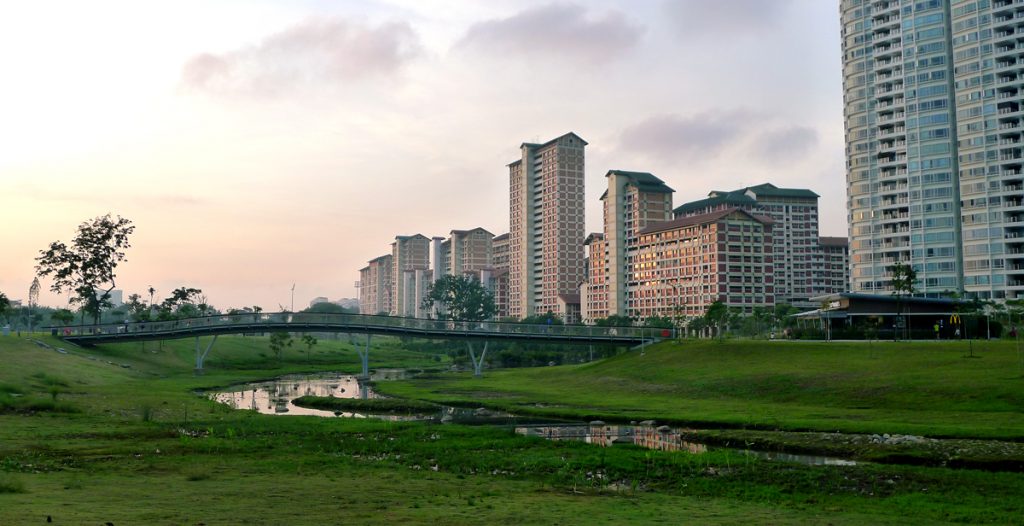
Bishan-AMK Park is one of the largest urban parks in Singapore. A concrete storm drain that ran through the park has been naturalised into a 3 kilometer meandering river with lush, vegetated banks. Photo: Wikimedia
Wetlands are an important component of our global climate system, and crucial for water security and resilience. As the world meets on climate change in Glasgow, the Convention on Wetlands (also known as the Ramsar Convention) is hosting several events highlighting the multiple benefits of wetland conservation and restoration.
The Secretariat of the Convention on Wetlands is organizing three events during COP 26:
- Financing Wetlands Conservation and Restoration for Climate Benefits – Challenges and Opportunities; 4 November, 10.00-12.00 UTC; Republic of Korea Pavilion; #COP26
- Partners for Wetlands: Decade for Wetland Restoration; 8 November, 11:00-12:00 UTC; Peatlands Pavilion; #COP26
- Leveraging MEA synergies: Peatland protection and restoration for climate outcomes; 10 November, 17:00-18:30 UTC; Peatlands Pavilion; #COP26
In addition, the Secretariat is also contributing to several other events.
See the overview here.
The Convention on Wetlands has also launched new publications on blue carbon ecosystems and peatlands These publications provide:
- Policy recommendations for managing peatlands and blue carbon ecosystems to mitigate climate change.
- Best practices on wise use and restoration of peatland ecosystems.
- Information on extent and carbon storage capabilities of blue carbon ecosystems in Wetlands of International Importance.
The value of wetlands in and around cities is often still not fully appreciated. In recent years, Ramsar has awarded the status of “Wetland City” for the conservation and wise use of urban and peri-urban wetlands. So far, 18 cities in China, France, Hungary, South Korea, Madagascar and Sri Lanka have achieved this distinction. Read more about the Wetland City Accreditation scheme and how your city can get involved here.
Many partner organisations of CitiesWithNature are doing important work on wetlands. Examples include the following:
ICLEI, through its Cities Biodiversity Centre, is working with the City of Johannesburg in South Africa, inter alia, to map urban natural assets such as wetlands, enhance water catchment management and to better manage invasive alien plant species (a critical threat to wetlands). Wetland Management Guidelines for Building Capacity and Supporting Effective Management of Wetlands within South African Municipalities have also been developed. Read the guidelines here.
The UN Environment Programme works on protecting peatlands for people and planet, as part of the Global Peatlands Initiative. Read more here. Ecosystems like wetlands and mangroves, also in and around cities, are a priority for the UN Decade on Ecosystem Restoration. Read more here.
Wetlands is also one of the important practice areas for WWF. Read more about their work here and here.
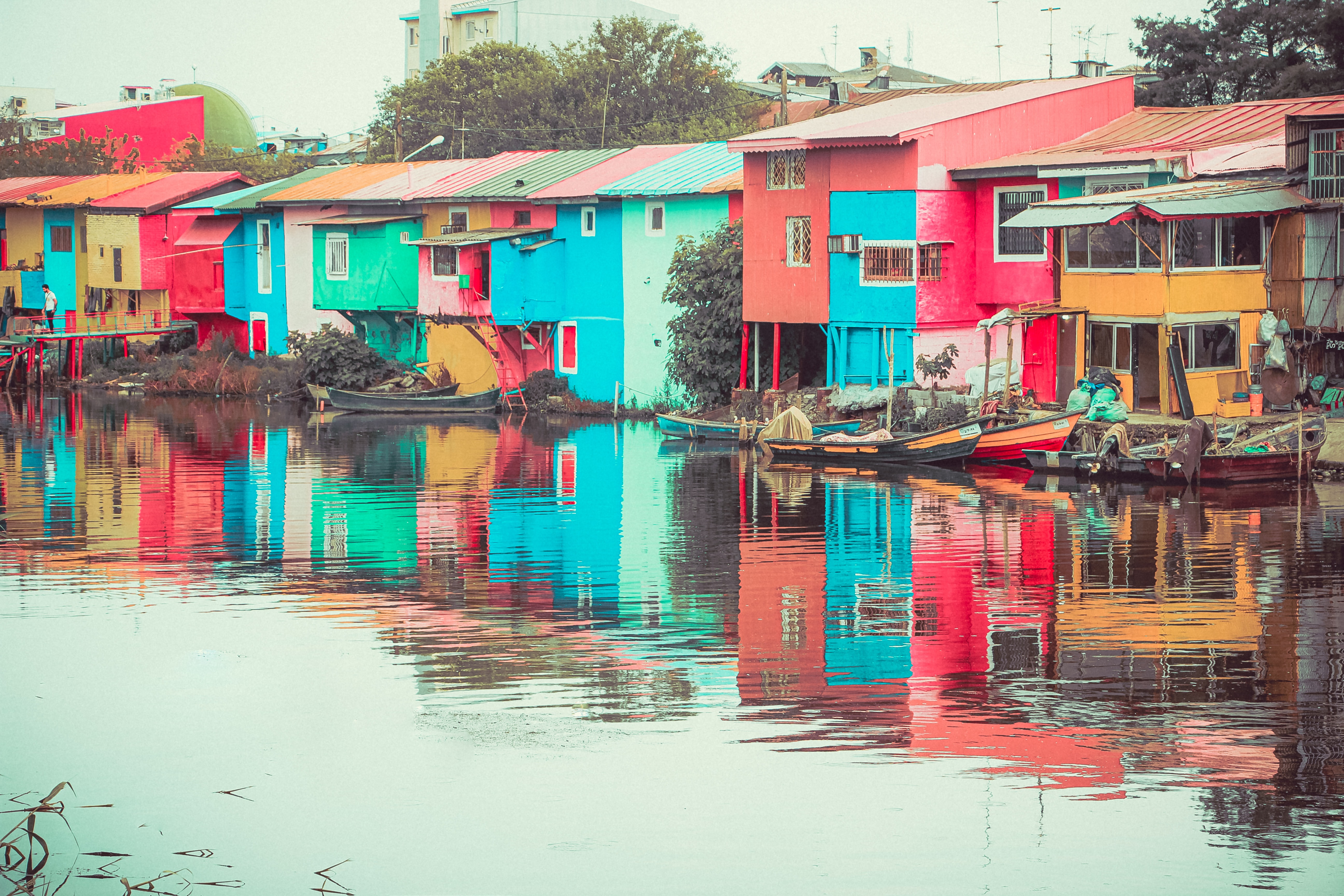
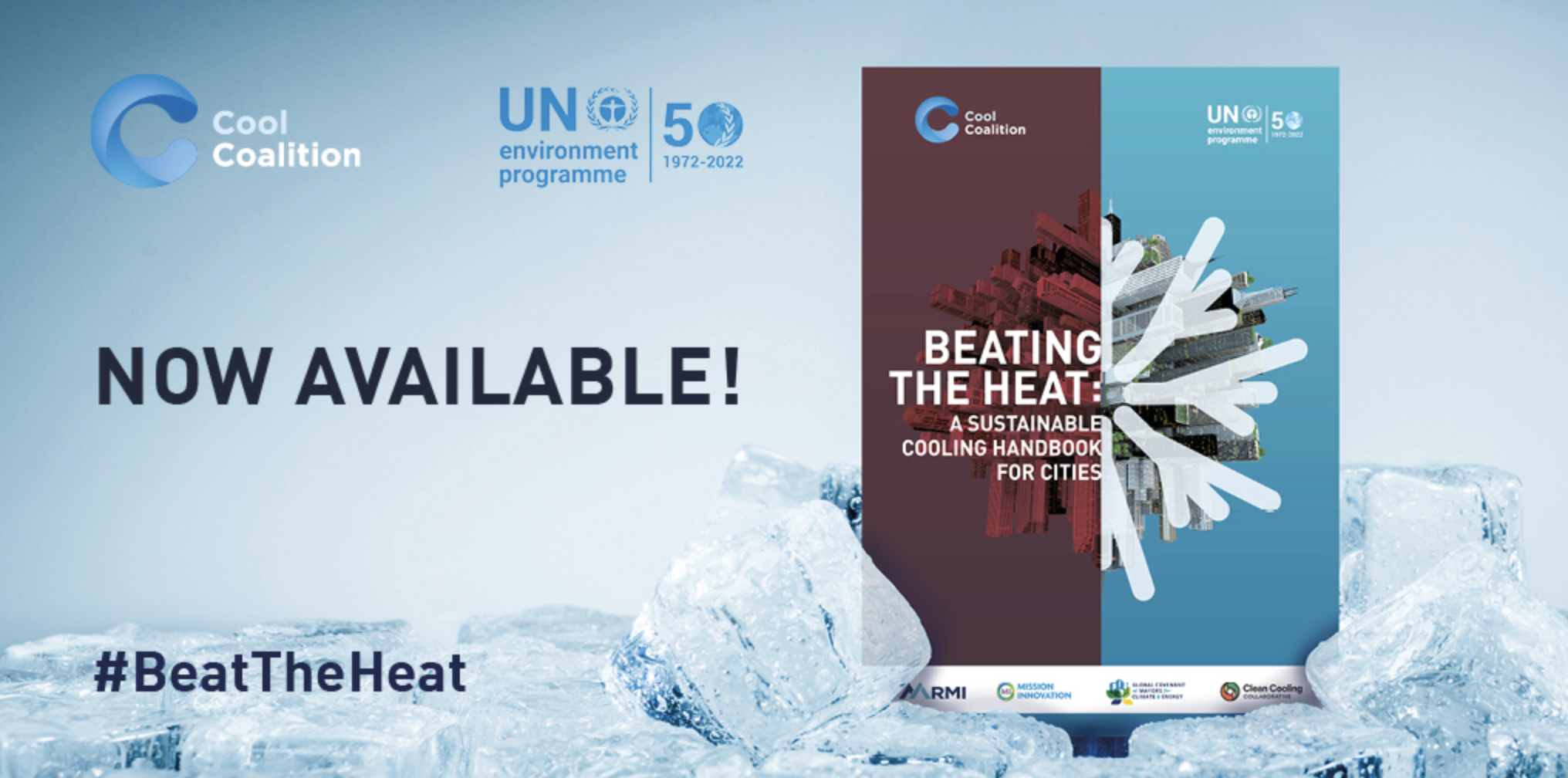
The UN Environment Programme (UNEP) launched their new handbook on 3 November at COP26 in Glasgow. The handbook provides detailed guidance to help the world’s cities address warming, which is occurring at twice the global average rate in urban areas.
Beating the Heat: A Sustainable Cooling Handbook for Cities, prepared with RMI, states that by the end of this century, many cities could warm as much as 4 °C if GHG emissions continue at high levels. Even at 1.5°C of warming, 2.3 billion people could be vulnerable to severe heat waves.
CitiesWithNature and its partner organisations are at COP26 in Glasgow making the case for climate and nature goals to be pursued together in the urban context. They are hosting various in person, hybrid and virtual events in and around COP26, starting 31 October and running until 12 November.
Read on for a summary of important urban nature and climate events you can attend (document attached below).
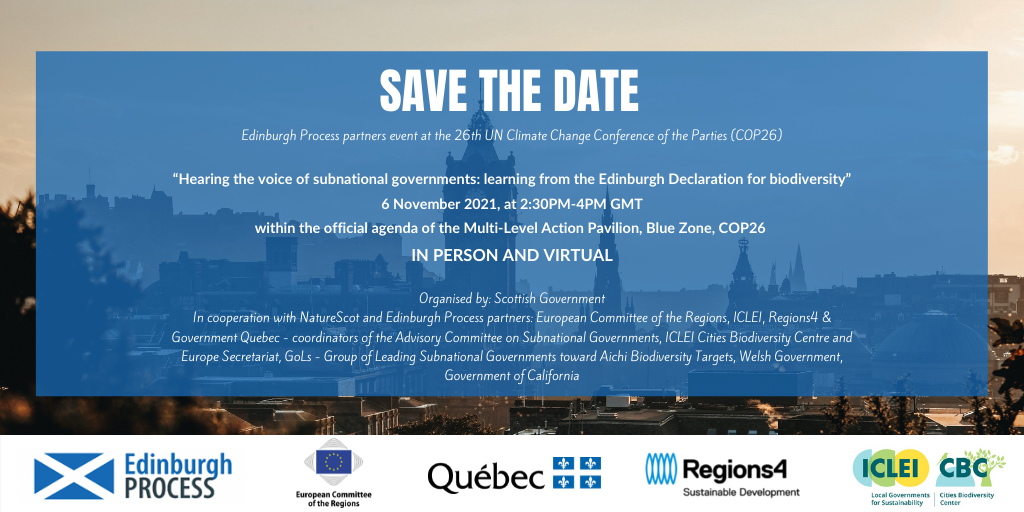
Nature-based Solutions and Cities | Geneva NbS Dialogues
We are facing a triple planetary crisis – climate change, nature loss and pollution. In this context, Nature-based Solutions (NbS) are a powerful ally to address a societal and environmental challenges. As per IUCN definition, NbS are actions to protect, sustainably manage and restore natural or modified ecosystems that address societal challenges effectively and adaptively, simultaneously providing human well-being and biodiversity benefits.
NbS are a powerful tool to facilitate and catalyse the engagement of cross-sectoral stakeholders to join forces towards the implementation of an ambitious Post-2020 Global Biodiversity Framework (GBF) and move towards achieving the CBD 2050 Vision of ‘Living in harmony with nature’. NbS also offer a pathway for synergies among several multilateral environmental agreements, including for biological diversity (CBD), climate change (UNFCCC), disaster risk reduction (Sendai Framework), desertification (UNCCD) and the wider Sustainable Development Goals (SDGs) – and for mainstreaming nature conservation into sectoral decision-making processes.
In the lead-up to a critical year for nature and society, NbS offer an opportunity to address a wide range of urgent societal challenges. The year 2021 and the major upcoming negotiations should indeed mark a turning point towards a resilient world for future generations.
Join the Geneva Environment Network and the International Union for Conservation of Nature in a one-year journey, where experts from all over the world and different sectors will discuss throughout the year how NbS are relevant to various debates ongoing in Geneva.
More information about the dialogues
We are happy to share that 8 80 Cities is now collaborating with CitiesWithNature to make cities around the world greener, healthier and happier places for young and old. CitiesWithNature is a unique initiative that recognizes and enhances the value of nature in and around cities across the world. It provides a shared platform for cities and their partners to engage and connect, working with a shared commitment towards a more sustainable urban world. 8 80 Cities is joining other leading partners of the CitiesWithNature initiative such as WWF, UNEP, IUCN, Cities4Forests and World Urban Parks.
On the CitiesWithNature platform, cities can embark on a journey to reconnect their communities to nature. Cities can showcase their nature projects on their city profiles, access over 200 cutting-edge tools and resources from partners on the Tools and Resources Hub, use the robust framework of the Nature Pathway to mainstream nature in their cities, connect with partner organizations, and more. Joining CitiesWithNature is free. Representatives from city governments can do so on the website or by writing to info@citieswithnature.org. Not part of a local or subnational government? You can still access various benefits on the website and subscribe for free to the CitiesWithNature Buzz, a monthly round-up of urban nature news and events from around the world.
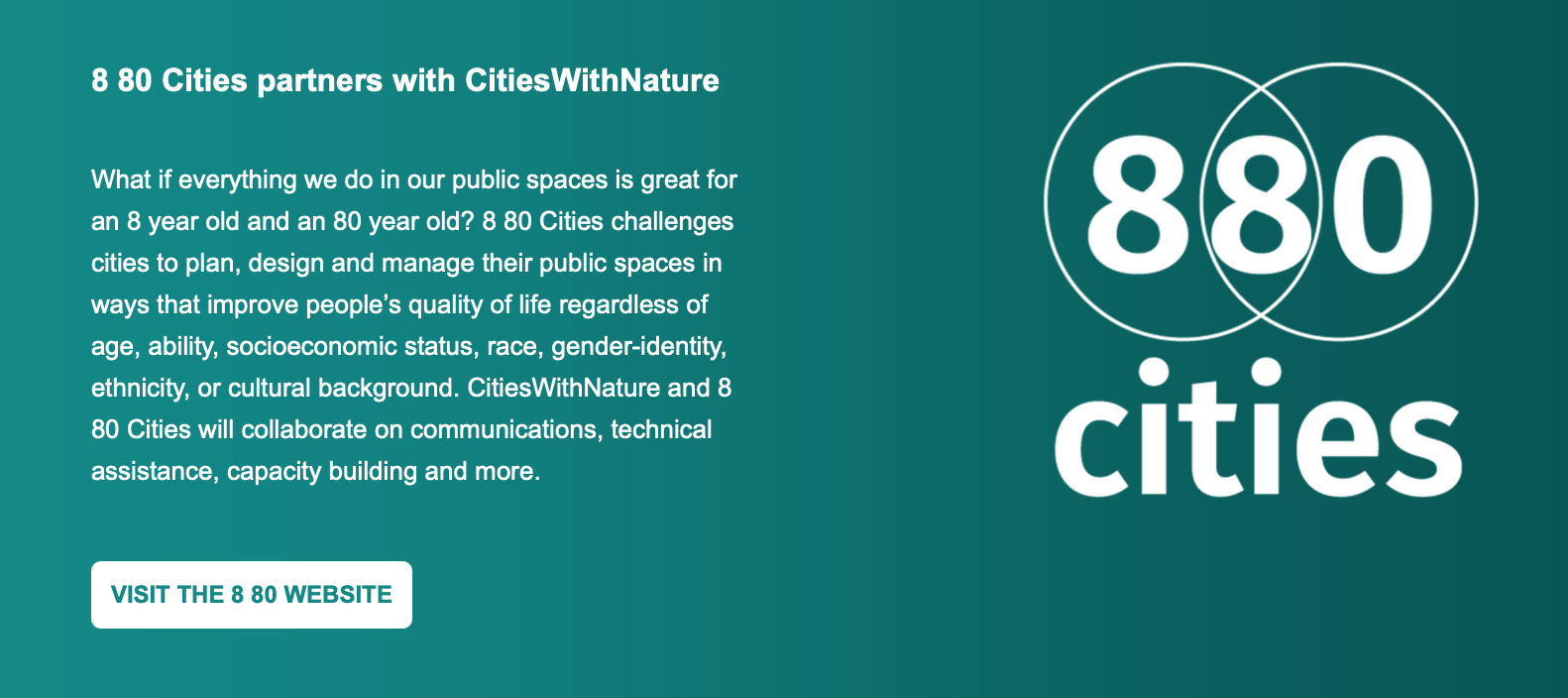
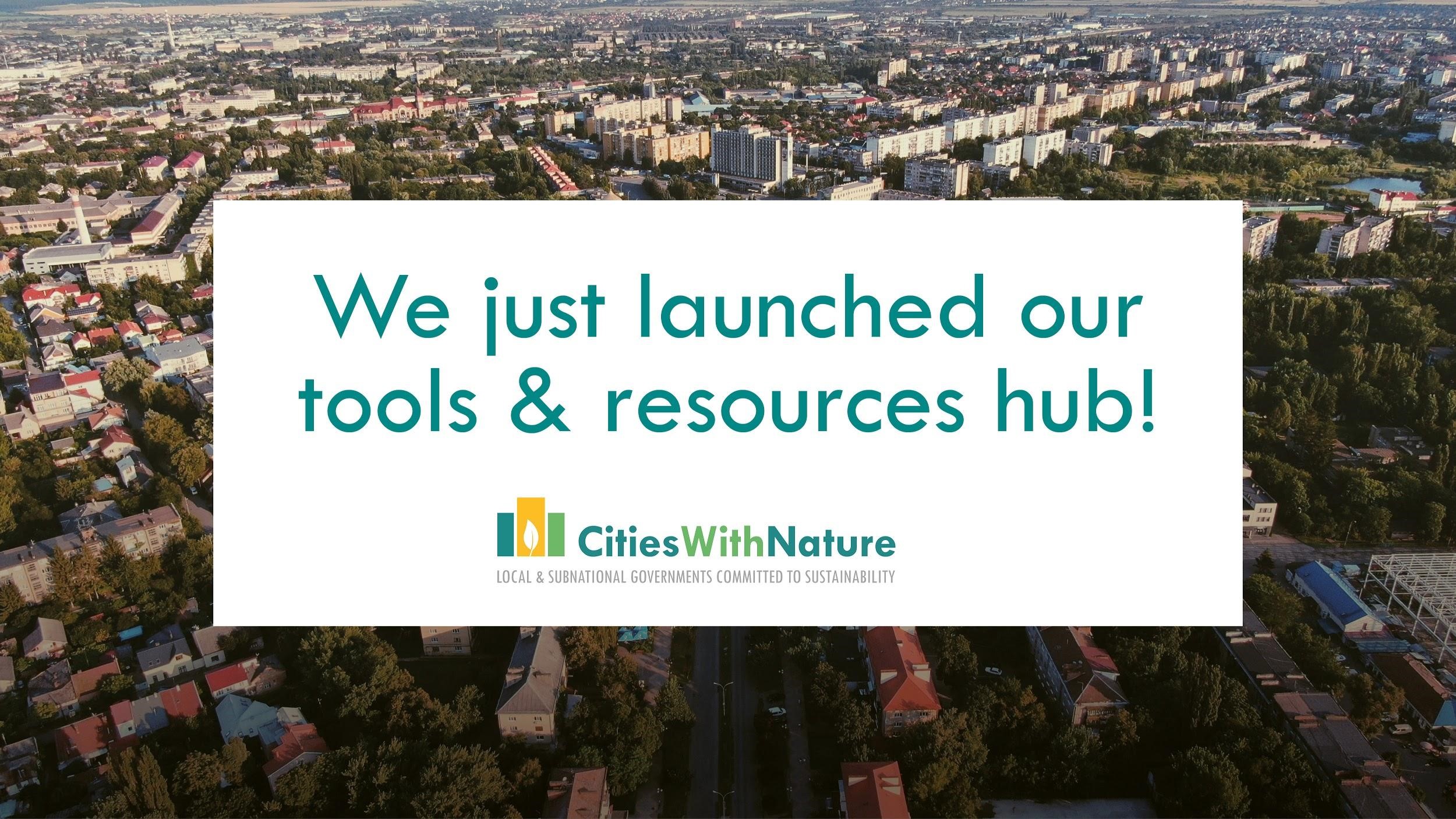
We just launched the Tools and Resources Hub. This new functionality on the CitiesWithNature platform offers a wide range of reliable resources and cutting-edge tools on biodiversity, nature-based solutions, ecosystem restoration, and more. Local and subnational governments signed up to CitiesWithNature have access to all functions of this database, but anyone can browse, learn and be empowered to act for nature in and around their cities.
Over 200+ carefully curated tools and resources are already available on the hub, and the database will grow further as more tools and resources from ICLEI Regional Offices, partner organisations and cities are added. Local and subnational governments that are signed up to CitiesWithNature are able to upload and share their own tools and resources on the hub. As the hub aims to offer tools and resources that are globally, regionally and/or locally relevant, please upload and share your tools and resources, or if you have not yet joined CitiesWithNature let us know about tools and resources that you specifically would like to see on the hub. All tools and resources shared should be available in the public domain and have an associated weblink that can be used to upload it.
Cities need to make many choices on a daily basis. The new CitiesWithNature Tools & Resources library is a place where they can find useful and up to date information, practical tools and guidance that will help them make those choices.
– Amanda Stone, Yarra City Council, Australia

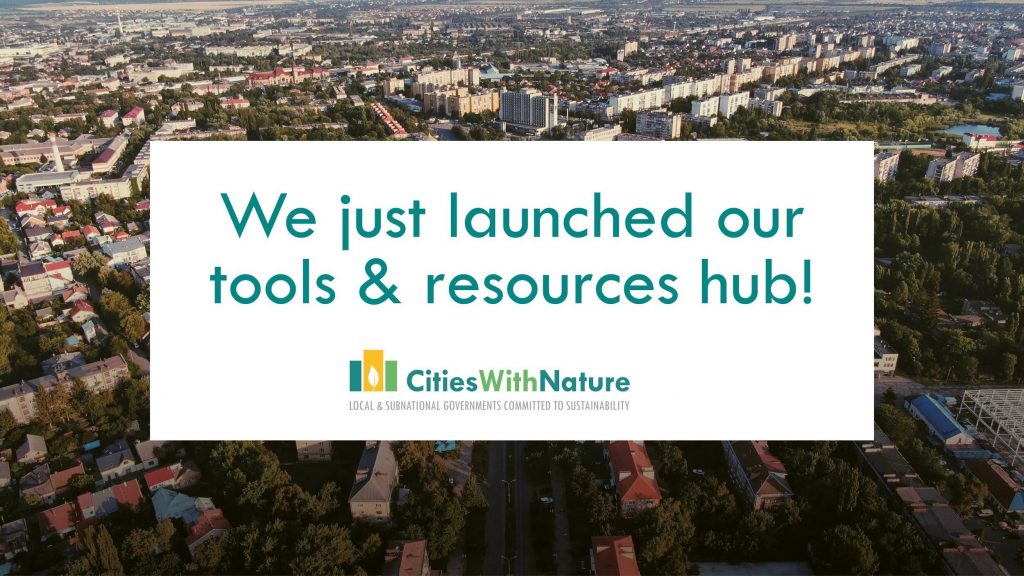
Introduction
What is the Tools and Resources Hub?
The Tools and Resources Hub is now live on the CitiesWithNature website.
We are excited to share that the Tools and Resources Hub of CitiesWithNature was launched early July! This new functionality on the CitiesWithNature platform offers a wide range of reliable resources and cutting-edge tools on biodiversity, nature-based solutions, ecosystem restoration, and more. Local and subnational governments signed up to CitiesWithNature have access to all functions of this database, but anyone can browse, learn and be empowered to act for nature in and around their cities.
Over 200+ carefully curated tools and resources are already available on the hub, and the database will grow further as more tools and resources from ICLEI Regional Offices, partner organisations and cities are added. Local and subnational governments that are signed up to CitiesWithNature are able to upload and share their own tools and resources on the hub. As the hub aims to offer tools and resources that are globally, regionally and/or locally relevant, please upload and share your tools and resources, or if you have not yet joined CitiesWithNature let us know about tools and resources that you specifically would like to see on the hub. All tools and resources shared should be available in the public domain and have an associated weblink that can be used to upload it.
Cities need to make many choices on a daily basis. The new CitiesWithNature Tools & Resources library is a place where they can find useful and up to date information, practical tools and guidance that will help them make those choices.
– Amanda Stone, Yarra City Council, Australia
How Does it Work?
You can access the Tools and Resources Hub even if you are not registered on CitiesWithNature yet. If you are a city, and have signed up, you can access the Tools and Resources Hub and also upload your own.
To access the Tools and resources Hub, you should go to the CitiesWithNature website and click on the MORE button, which is located in the menu bar at the top of your screen. Once you click on MORE, a drop-down will be made available and you will see ‘Tools and Resources Hub’ as part of the drop-down list. You can click here to access the hub.
Once you are in the Hub, you will be able to browse and engage with 200+ Tools and Resources that have been uploaded. Each tool/ resource provides you with a link to the downloadable PDF version.
If you are a registered city, you can login to your account and browse, engage or upload your own resource.
If you would like to upload one of your own tools or resources, you may click on the “upload a resource tab” and follow the steps provided on the website and fill in the required information.

Want to know more?
If you have any queries about the Tools and Resources Hub or another aspect of CitiesWithNature, please let us know and we would be glad to assist. Thank you very much for your support and involvement in CitiesWithNature.
IUCN, together with Pegasus Capital Advisors (Pegasus), BNP Paribas, Gold Standard, and R20 – Regions of Climate Action, have launched the Sub-national Climate Finance Initiative (SCF), a novel global funding instrument to mitigate climate change and strengthen community resilience projects, with an initial commitment of up to USD 150 million from the Green Climate Fund (GCF).
Mid-sized infrastructure projects at a sub-national level (e.g. municipalities, provinces) of around USD 30 to 50 million are playing a central role in improving the resilience of local communities to the impacts of climate change, especially in developing countries.
Dr Bruno Oberle, Director General IUCN, noted, “The private and public sectors need to work together to fast track nature-based solutions which benefit the environment, societies, and investors alike, with positive impacts on climate and societal resilience. IUCN has long championed this approach, and will lean on the Union’s expertise to ensure that investments by the SCF are not just financially, but also environmentally and socially sound.”
